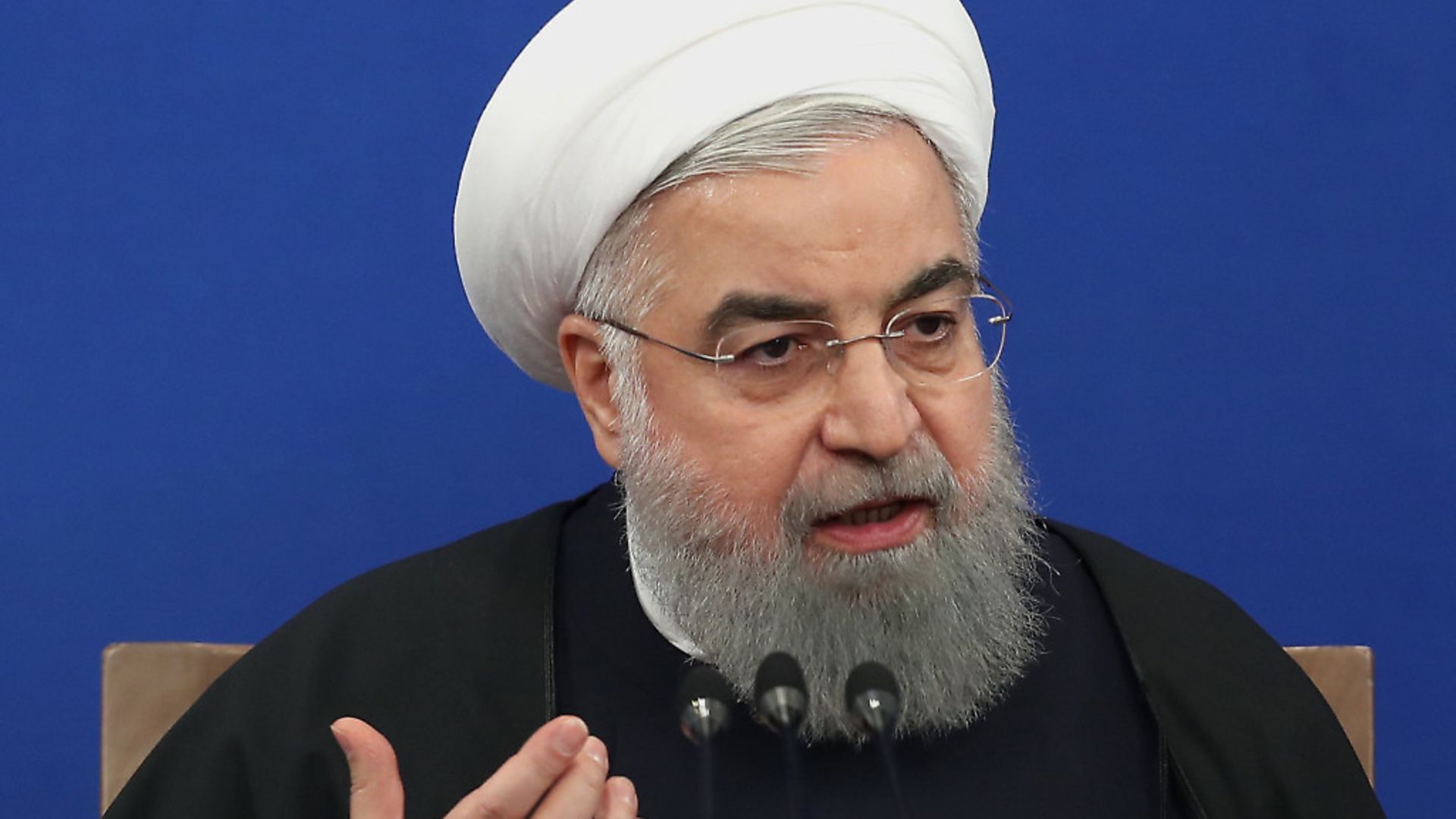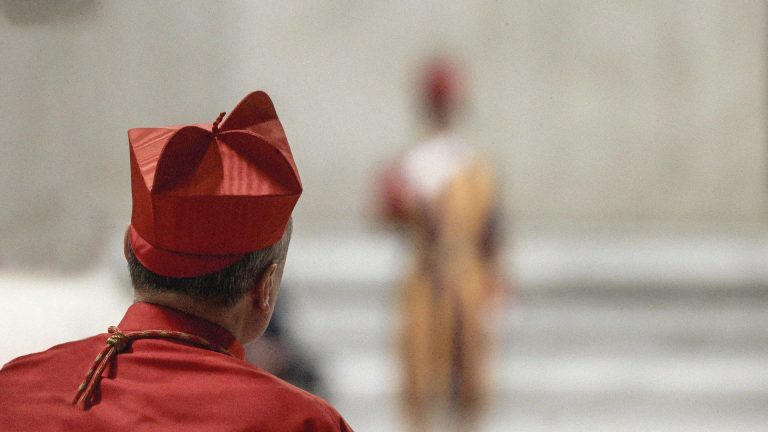
The Iran nuclear deal is hanging by a thread, says former diplomat PAUL KNOTT, who worked on the agreement. If it fails, the world becomes a much more dangerous place.
The Iran nuclear deal of 2015 has been a success. Its sole purpose was to stop the country’s development of nuclear weapons, and that is exactly what it has done.
Yet the agreement’s continued success is under threat from Donald Trump’s repeated threats to rip it up. There is no indication that the US president wants Iran to restart its nuclear weapons programme, although that would almost certainly be the outcome of ending the deal.
Rather, Trump appears to be driven by his pathological desire to destroy the achievements of the Obama administration and the need to keep his hardcore base in a frenzy by creating bogeymen for them to hate.
Trump has offered no proposals for improving the agreement. Nor has he explained how he would prevent a resumption of the slide into nuclear-armed conflict that was under way in the Middle East before the deal was made.
Nonetheless, he has set the clock ticking for the agreement to be blown-up by stating that he will reimpose sanctions on Iran and withdraw from the deal on May 12, unless Congress and the other parties to the agreement manage to amend it to his satisfaction before then.
The other parties to the deal – formally titled the Joint Comprehensive Plan of Action (JCPOA) – are Britain, France, Germany, Russia, China and the EU. Trump’s declaration puts the Europeans in a very tight spot.
Of late, two of them have not been much of a position to tackle an international issue of this magnitude. Germany has been temporarily distracted by discussions on forming a new governing coalition, while Britain has been burdened with a government and foreign secretary incapable of handling a task of this complexity. They are also, in any case, hopelessly mired in Brexit.
Unlike Britain, which appears to be a lost cause as a serious global power for the foreseeable future, Germany’s recent coalition deal means the country will likely emerge from its brief bout of navel gazing to join the resurgent French in taking on the immense challenge of mitigating Trump’s destructiveness.
As is often said, every crisis contains an opportunity. Trump’s last attempt to torpedo a major international agreement was his withdrawal of the US from the Paris Climate Accord. All this achieved was to prompt France and China to take over America’s global leadership role, with the agreement carrying on regardless. On the face of it, saving the Iran agreement could perhaps follow the same pattern, with the Europeans and Chinese taking over in the wake of the Americans rendering themselves irrelevant.
Sadly, the links between the two situations are only superficial. Maintaining the Iran nuclear deal in the face of American destructiveness would be much more challenging.
The agreement took more than a decade to negotiate. Being involved in the process in a very minor role as a British diplomat provided me with a personal insight into just how painstakingly difficult and detailed the negotiations were.
I am convinced that the final deal was the absolute best outcome that could be achieved. There are no obvious elements that could be reopened or amended, even cosmetically, to save Trump’s face. Every conceivable angle and approach was already explored during the original talks.
Trump has talked blithely about wanting a reworked agreement to add restrictions on Iran’s interference in the affairs of its regional neighbours and its acquisition of other armaments. It is possible that he is too deluded or uninterested to know that this was previously explored at great length. But his senior advisors must surely know that the deal had to stick solely to the matter in hand – Iran’s nuclear programme – in order to be struck.
Whatever returning to the deal entailed, working out how to engage Iran would be challenging. The international inspectors appointed as part of the JCPOA have confirmed that Iran has consistently fulfilled its part of the bargain. The Iranians will see no justification for reopening it and will take a lot of persuading to do so.
The deal is already less popular in Iran than when it was signed. It was sold to its people as an agreement that would lead to international sanctions being lifted and increase their prosperity. Most Iranians have yet to feel this positive impact.
The Iranian negotiators had an immensely difficult task in selling the deal to senior political and security figures at home. This was because it entailed giving up a cherished objective – acquiring a nuclear weapons capability to protect themselves from regime change. One of the sceptics’ strongest arguments was that Iran should not surrender this deterrent because the Americans could not be trusted to respect any deal. Trump has now proved them right and, in effect, exposed the reformists in Iran as mugs.
In terms of providing leadership, China is far less relevant to the Iran deal than it was to the Paris Climate Accord. China is one of the world’s largest polluters, but also in the vanguard of green energy technology development.
By contrast, it was the least engaged of those involved in the Iran nuclear talks. Rather than being a prime mover, China was only really invited to participate in recognition of its UN Security Council permanent membership, as well as to discourage it from undermining the pressure on the Iranians by buying too much of their embargoed oil.
Russia has closer ties to Tehran and was much more deeply involved than the Chinese, albeit not always in a constructive manner. The Russians often treated their role as being a proxy for the Iranians during the preparatory discussions between the other parties. Moscow’s main interest in the talks was to protect its substantial sales of civil nuclear technology and materials to Iran.
It also saw the Iran nuclear issue as an opportunity to insert itself into Middle Eastern matters and create mischief for the West – a role to which it has become far more deeply committed during the two years since the deal was done.
The US was pivotal to the agreement, to the extent that the later stages of the negotiations essentially became a bilateral affair between the then Secretary of State, John Kerry, and his Iranian counterpart, Mohammed Javed Sharif.
The main incentives for the Iranians to do the deal were the release of frozen funds and the lifting of economic sanctions. The largest proportion of those funds were held in the US. And the sanctions stand or fall by US involvement. Even those measures that do not directly involve US companies are designed to compel international firms to decide whether they want to do business in Iran or the US. The vast majority of them take the obvious, latter option.
Ultimately, when it comes to Iran, the US carries most of the carrots and sticks. The only feasible route to keeping the deal afloat lies through Washington, rather than Tehran, Beijing and Moscow. The Europeans need to step up their lobbying of the US Congress to stymie their president on this issue – a tough challenge with a Republican-led Congress that can see its majority slipping away at the mid-term elections later this year.
The supposed voices of reason among Trump’s senior advisors must also be approached. Again, though, this will be an uphill struggle. The assorted generals among them all tend to be hawks on Iran. In particular, the defence secretary James Mattis apparently – and not entirely unjustifiably – harbours a strong grudge against Iran for its covert involvement in the killing of US soldiers who were under his command when he served in Iraq.
Should that lobbying effort fail, then the Iran nuclear deal is likely to fall victim to Trump’s wrecking ball. Iran restarting its nuclear weapons programme as a consequence would prompt Israel to revive its plans for military action against it, at the risk of triggering a major conflict between them. Other regional rivals of Iran, notably Saudi Arabia, would feel the need to acquire their own bomb. More widely, the US reneging on the Iran deal would discourage any prospective nuclear weapons states – such as North Korea – from entering into an accord for the foreseeable future. The agreement’s demise would make the world a much more dangerous place for us all.
• Paul Knott is a former British diplomat and the author of The Accidental Diplomat; he lives in Switzerland.









